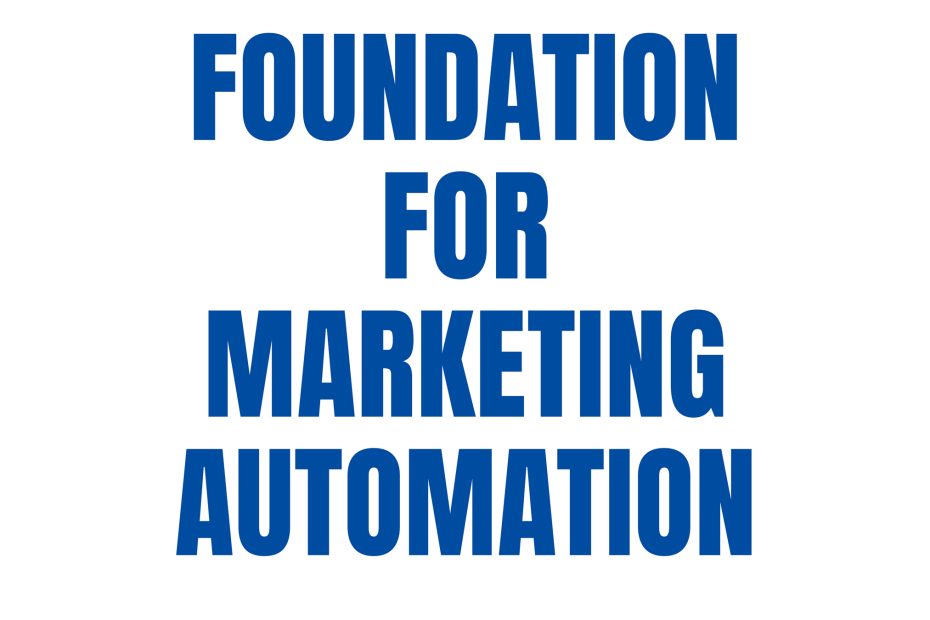In the fast-paced digital world of today in which customer expectations are constantly changing, businesses have to quickly adapt to stay ahead of competitors. Marketing automation is emerging as an innovation that will allow businesses to simplify their marketing activities, improve customer engagement, and accelerate the growth of their business. To fully harness the potential of automation in marketing, you must have a solid foundation. We’ll dive into the key elements that form the foundation of a successful marketing automation.
What is the foundation for effective Marketing Automation?
1. Clear Objectives and Strategy
Before you begin exploring the world that is marketing automation you need to set out your goals and develop a strategy that is well thought-out. What goals do you have? Do you want to nurture leads, increase retention of customers, or boost sales? With a clear strategy, you can ensure that your efforts to automate marketing are in line with your business goals, which makes it easier to assess results and make the necessary adjustments.
2. Quality Data and Segmentation
Effective marketing automation depends on top-quality data. Make sure your database is safe and accurate. It should also be up-to-date. Additionally segmentation is the main ingredient in a personalizing marketing. Separate your target audiences into distinct segments according to demographics, behavior and preferences. This lets you send relevant, targeted messages, increasing the probability for engagement as well as conversion.
3. Comprehensive Customer Journey Mapping
Understanding the journey of your customers is essential. Consider the different ways that a potential customer or prospect interacts to your company. This lets you design customized content and automate interactions that lead them throughout the funnel of sales beginning with the initial awareness phase, through conversion, and beyond.
4. Content Strategy and Creation
Content is the heartbeat for marketing automation. Plan a content strategy that is tailored to the needs and desires of your targeted audience. Create various types of content including blog posts or emails, videos, and webinars to interact with your audience at each phase in their travels.
5. Marketing Automation Platform Selection
The right choice for a marketing automation system is akin to picking the ideal tool for the job. Be sure to consider factors like scaling, usability as well as integration capabilities and pricing. A suitable platform will form the basis for your automated efforts assisting you to run campaigns effectively and effectively track your performance.
6. Testing and Optimization
Marketing automation isn’t an “set it and forget it” initiative. Always test the various elements of your marketing strategies from subject lines to the content and then analyze the outcomes. Utilize A/B testing as well as different analytical software to improve your strategy continuously. Optimizing your strategy is essential to remain relevant and effective in an constantly changing digital world.
7. Compliance and Data Security
Compliance with data privacy regulations and protecting customers’ data is not a matter of choice. Failure to comply with this can cause serious consequences. Check that your marketing automation procedures comply with the regulations such as GDPR as well as CCPA and you have strong security procedures in place to safeguard confidential information.
8. Training and Skill Development
Spend money on training for the team of your Marketing Automation. Give them the tools and expertise required to manage the platform you choose and make educated choices. A trained team can utilize the automation tools to their maximum potential.
9. Continuous Monitoring and Reporting
Monitor your marketing automation efforts and monitor the key indicator of performance (KPIs). Produce comprehensive reports that give insight into what’s working and what can be improved. This approach based on data lets you make informed decisions and continuous improvements.
10. Adaptability and Evolution
Also, be aware that the landscape of digital marketing is constantly changing. What is effective today may not be the same in the future. Stay flexible and open to new strategies and technologies. Learn from your experience and the evolving preferences of your customers.
In the end, the basis to a successful marketing automation program is a multi-faceted approach that includes clear goals and high-quality data, personalised content and the appropriate tools to meet compliance requirements, as well as the commitment to continuous improvement. By leveraging these foundations, your company will be able to harness the full potential of marketing automation, which will drive expansion and strengthening customer relationships in a digital world.





